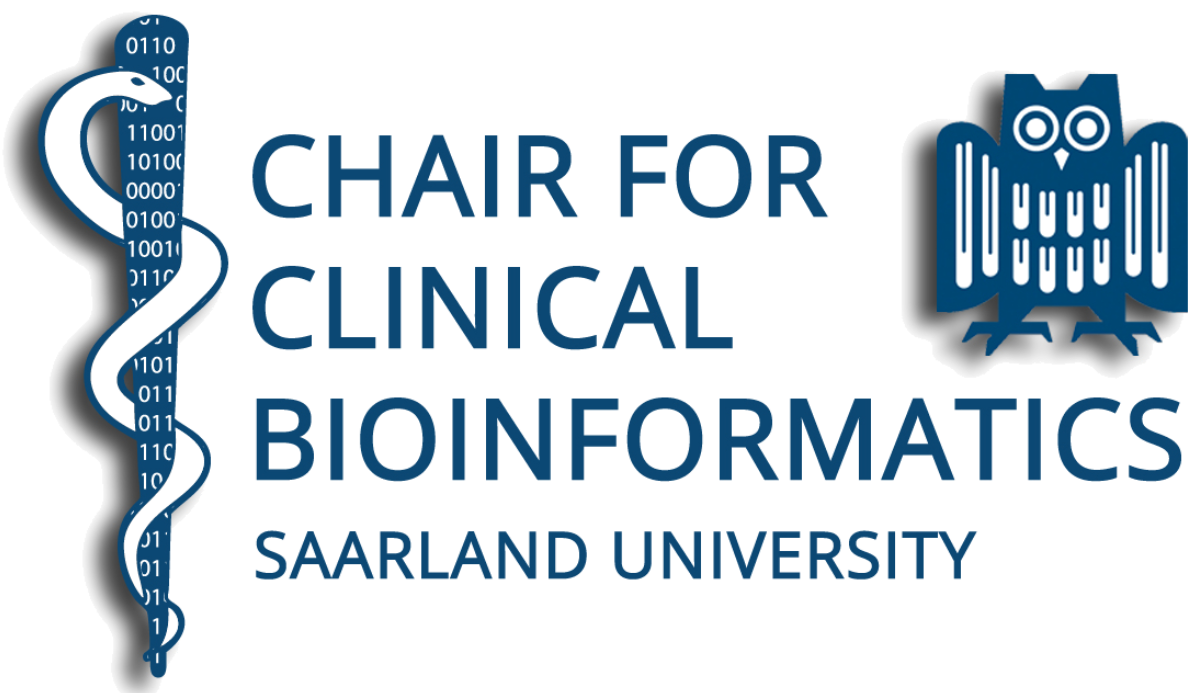This is a block Pro-/Seminar for Bioinformatics students.
Overview: Single-cell studies are among the very rising topics of the last few years and will strongly shape future developments of bioinformatic methods. Applying transcriptomics to measure the dynamics of gene-expression under various conditions, on the other side, is already well-established in the scientific literature, and currently experiences another up-surge due to high-throughput single-cell sequencing. In the course of this seminar, we will cover the basics of the different single-cell RNA-seq techniques and swiftly move on to advanced bioinformatics methods that help to understand the sparse single-cell datasets. To this end, we will have a look at the diverse steps of data quality assurance and technical and / or biological bias detection methods, which are necessary to implement effective single-cell RNA analysis pipelines.
Dozent: Prof. Dr. Andreas Keller
Tutor: M.Sc. Friederike Grandke
Key dates:
| Registration * [mandatory] | From April 14 to April 24, 2023 HERE |
| Kick-off meeting [mandatory] | May 03, 2023, Starting at 11 am. (slides) |
| Summary submission deadline [mandatory] | May 17, 2023 |
| Deadline to register in HISPOS OR de-register from seminar * [mandatory] | May 24, 2023 |
| Deadline for feedback ** [optional] | July 21, 2023 |
| Presentations [mandatory] | August 4, 2023 |
| Essay submission deadline [mandatory] | August 11, 2023 |
* If you want to deregister from the seminar, please send the tutor an email irrespectively whether you (de)registered in HISPOS or not.
** If you would like to get feedback about your slides, e.g. to improve your presentation before the talk, send your slides to the tutor before the feedback deadline. We strongly encourage you to take this opportunity. When asking for feedback the more complete the submitted presentation the more helpful our feedback can be. Thus, try to avoid submitting half-finished slides. Feedback will be provided at least once but at most twice per participant. Also, before sending in the slides, check out our support materials (presentation guidelines, presentation guidelines checklist). You must hand-in a (digital) copy of the completed guidelines checklist at latest when performing the presentation.
Please note: Your slides will make up a substantial part of the final grade. Reading and paying attention to the provided presentation guidelines will help you to get an impression of which aspects are relevant for the evaluation. Disregarding many of the points listed in the guidelines may
negatively affect your grade.
Place and Time for Presentations:
- TBA
Requirements for participation (Bioinformatics):
- Proseminar (Bachelor): at least in 3rd semester, Bioinformatics I
- Seminar (Master): no pre-requisites.
Good language skills are presumed as all talks will be held in english language.
Certificate requirements:
- Summary of the assigned paper:
- Submission until 17th of May
- 3 pages (at least 1500 words in Arial with standard font size 12)
- Figures, tables and formulas are not required. Figures and tables are only accepted if they have been created completely by yourself and should be included in the 3 pages. If a figure or table is based on a figure or table in the paper, a reference to it must always be given. If a reference chapter is used, it should be additional to the 3 pages.
- The text should be written in your own words, no copying from the paper or other sources. The texts will be checked for plagiarism.
- We do not want any additional sources to be used in this summary. Only the assigned paper itself should serve as a source.
- Successful presentation:
- Talk: 30 minutes for a Pro-seminar and 40 minutes for a Seminar
- Discussion: 5 minutes during which you should be able to answer questions from the tutor(s)/audience
- Attendance to all presentations is mandatory
- Essay of the assigned paper:
- Submission until 11th of August (one week after the presentation)
- Main structure: Title (page), main text (with or without subsections), references
- Ca. 2 pages of text excluding title (page), section titles and the references (Arial with standard font size 12)
- Figures, tables and formulas are not required. Figures and tables are only accepted if they have been created completely by yourself and should be additional to the 2 pages.
- The text should be written in your own words, no copying from the paper or other sources. The texts will be checked for plagiarism.
- Here we want that you use additional information from other sources, which must be referenced in the Reference section at the end. The Reference section should be excluded from the 2 pages.
- It is recommended to write the report using LaTeX in order to train scientific writing
Final grade based on:
- the summary (25%)
- the presentation & follow-up discussion (50%)
- the essay (25%)
Topics
All manuscript files are either open-access or available via the university network using a secure VPN connection.
Recommended readings
Students who either have a shallow understanding on the topic and / or want to prepare for the course should consider reading the following papers:
- Eleven grand challenges in single-cell data science
- Current best practices in single‐cell RNA‐seq analysis: a tutorial
- Single-cell RNA sequencing technologies and bioinformatics pipelines
- The promise of single-cell sequencing
- Single-cell sequencing-based technologies will revolutionize whole-organism science
- A practical guide to single-cell RNA-sequencing for biomedical research and clinical applications
- Integrative single-cell analysis
